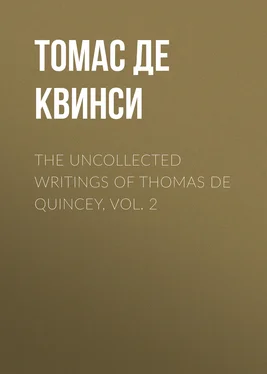Томас Де Квинси - The Uncollected Writings of Thomas de Quincey, Vol. 2
Здесь есть возможность читать онлайн «Томас Де Квинси - The Uncollected Writings of Thomas de Quincey, Vol. 2» — ознакомительный отрывок электронной книги совершенно бесплатно, а после прочтения отрывка купить полную версию. В некоторых случаях можно слушать аудио, скачать через торрент в формате fb2 и присутствует краткое содержание. Жанр: foreign_prose, literature_19, foreign_antique, на английском языке. Описание произведения, (предисловие) а так же отзывы посетителей доступны на портале библиотеки ЛибКат.
- Название:The Uncollected Writings of Thomas de Quincey, Vol. 2
- Автор:
- Жанр:
- Год:неизвестен
- ISBN:нет данных
- Рейтинг книги:3 / 5. Голосов: 1
-
Избранное:Добавить в избранное
- Отзывы:
-
Ваша оценка:
- 60
- 1
- 2
- 3
- 4
- 5
The Uncollected Writings of Thomas de Quincey, Vol. 2: краткое содержание, описание и аннотация
Предлагаем к чтению аннотацию, описание, краткое содержание или предисловие (зависит от того, что написал сам автор книги «The Uncollected Writings of Thomas de Quincey, Vol. 2»). Если вы не нашли необходимую информацию о книге — напишите в комментариях, мы постараемся отыскать её.
The Uncollected Writings of Thomas de Quincey, Vol. 2 — читать онлайн ознакомительный отрывок
Ниже представлен текст книги, разбитый по страницам. Система сохранения места последней прочитанной страницы, позволяет с удобством читать онлайн бесплатно книгу «The Uncollected Writings of Thomas de Quincey, Vol. 2», без необходимости каждый раз заново искать на чём Вы остановились. Поставьте закладку, и сможете в любой момент перейти на страницу, на которой закончили чтение.
Интервал:
Закладка:
Next, then, having endeavoured to place these preliminary points in their true light, I will anticipate the course by which the campaign would naturally be likely to travel, supposing no alien and mischievous disturbance at work for deranging it. Simply to want fighting allies would be no very menacing evil. We managed to do without them in our pretty extensive plan of warfare fifteen years ago; and there is no reason why we should find our difficulties now more intractable than then. I should imagine that the American Congress and the French Executive would look on uneasily, and with a sense of shame, at the prospect of sharing largely in commercial benefits which they had not earned, whilst the burdens of the day were falling exclusively upon the troops of our nation; but that is a consideration for their own feelings, and may happen to corrode their hearts and their sense of honour most profoundly at some future time, when it may have ceased to be remediable. If that were all, for us there would be no arrears of mortified sensibilities to apprehend. But what is ominous even in relation to ourselves from these professedly inert associates, these sleeping partners in our Chinese dealings, is, that their presence with no active functions argues a faith lurking somewhere in the possibility of talking the Chinese into reason. Such a chimera, still surviving the multiform experience we have had, augurs ruin to the total enterprise. It is not absolutely impossible that even Yeh, or any imbecile governor armed with the same obstinacy and brutal arrogance, might, under the terrors of an armament such as he will have to face, simulate a submission that was far from his thoughts. We ourselves found in the year 1846, when in fidelity to our engagements we gave back the important island of Chusan, which we had retained for four years, in fact until all the instalments of the ransom money had been paid, that a more negligent ear was turned to our complaints and remonstrances. The vile mob of Canton, long kept and indulged as so many trained bull-dogs, for the purpose of venting that insolence to Europeans which the mandarins could no longer utter personally without coming into collision with the treaty, became gradually unmanageable even by their masters. In 1847 Lord Palmerston, then Foreign Secretary, was reduced to the necessity of fulminating this passage against the executive government of the murdering city—'You' (Lord Palmerston was addressing Sir John Davis, at that time H. M. Plenipotentiary in China) 'will inform the Chinese authorities, in plain and distinct terms, that the British Government will not tolerate that a Chinese mob shall with impunity maltreat British subjects in China, whenever they get them into their power; and that if the Chinese authorities will not punish and prevent such outrages, the British Government will be obliged to take the matter into their own hands; and it will not be their fault if, in such case, the innocent are involved in the punishment sought to be inflicted on the guilty.'
Читать дальшеИнтервал:
Закладка:
Похожие книги на «The Uncollected Writings of Thomas de Quincey, Vol. 2»
Представляем Вашему вниманию похожие книги на «The Uncollected Writings of Thomas de Quincey, Vol. 2» списком для выбора. Мы отобрали схожую по названию и смыслу литературу в надежде предоставить читателям больше вариантов отыскать новые, интересные, ещё непрочитанные произведения.
Обсуждение, отзывы о книге «The Uncollected Writings of Thomas de Quincey, Vol. 2» и просто собственные мнения читателей. Оставьте ваши комментарии, напишите, что Вы думаете о произведении, его смысле или главных героях. Укажите что конкретно понравилось, а что нет, и почему Вы так считаете.












